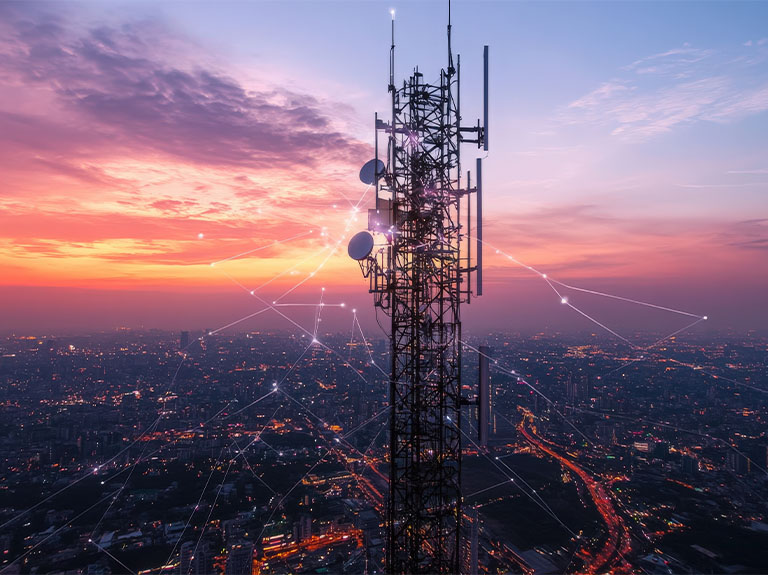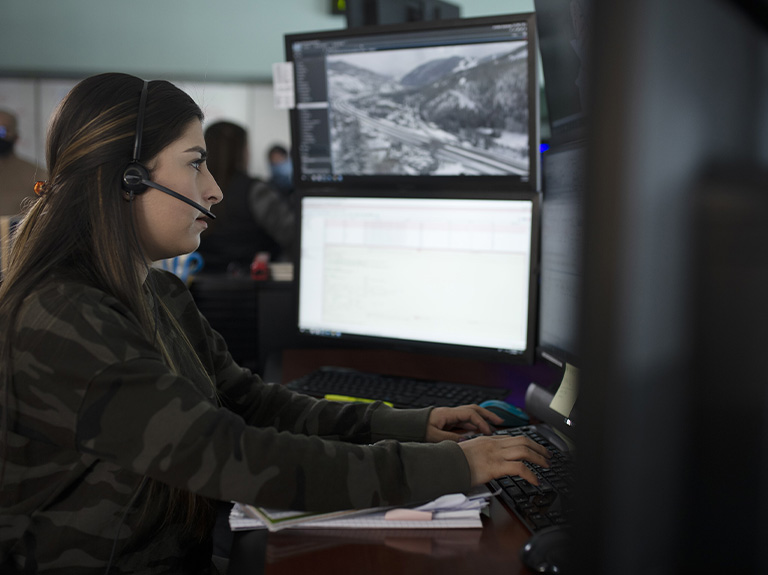Emergencies are unpredictable and during these critical moments, the public safety community needs reliable, interoperable communications. That’s why our approach to 5G for public safety is unlike anything else. And that means it’s not the typical approach to 5G you’ve seen in television commercials.
5G on FirstNet® – America’s public safety network – is a one-of-a-kind experience that gives our nation’s first responders the early benefits of this next-generation connectivity while continuing to use LTE, the current gold standard for reliable mobile broadband, for their mission-critical needs. First responders maintain voice communications with always-on priority and preemption on LTE, while the FirstNet network determines the best route for data traffic, whether that’s 5G or LTE spectrum.
In April 2021, we upgraded the dedicated FirstNet network core to enable reliable 5G connectivity and opened access to AT&T high-band 5G+ spectrum. Later that year, we expanded access to AT&T low-band 5G. And now, we’re giving this vital community access to the “sweet spot” of 5G – AT&T mid-band 5G+. All public safety needs to access 5G on FirstNet is a FirstNet Ready® 5G device like the Samsung S21 Ultra 5G.
So, what is 5G for first responders like today? We’re delivering 3 flavors of 5G on FirstNet using AT&T spectrum bands. Public safety in about 100 markets across the country have access to at least 1 of the 3 flavors of 5G – and we’re continuing to roll out additional 5G connectivity for FirstNet in more communities nationwide:
- High-Band 5G+: Public safety agencies and organizations in parts of more than 45 cities and 45+ venues get super-fast speeds and unprecedented performances in these high traffic areas. This includes places like Los Angeles International Airport and Raymond James Stadium in Tampa where crowds gather for amazing concerts or major sporting events like the Big Game (which is really a massive public safety event).
- Mid-Band 5G+: Now, this vital community has access to the “sweet spot” of 5G spectrum in more than 40 cities from coast to coast, including Boston, Charlotte, Chicago, Minneapolis, Nashville, Phoenix, Seattle and St. Louis. Mid-band 5G+ spectrum fills the gap between our other bands and provides a great combination of ultra-fast speeds and wide geographic coverage.
- Low-Band 5G: First responders in more than 30 cities across the United States – including Austin, Texas; Phoenix, Arizona and Knoxville, Tennessee – can connect using low-band 5G spectrum. It can travel farther, as well as penetrate through buildings and infrastructure better than high-band 5G+.
Looking ahead: Many might ask, “why can’t 5G be deployed on FirstNet like it is on commercial networks?” Simply put, when public safety is responding and lives are on the line, reliability is key. And many of the standards that protect their crucial communications from network congestion have not yet been implemented for 5G by the industry.
So, while we’re bringing this community specialized features and capabilities that they’ve never had before, we also have an eye to the future. It isn’t going to happen overnight. But we’re actively working to develop the necessary standards and vendor support to create a 5G environment that aligns with public safety’s mission.
Our strategy for 5G on FirstNet takes advantage of the true evolution from 4G to 5G. FirstNet will continue to be a fast follower on 5G while driving innovation of and integration in tested and established mission-critical services on 4G for public safety operations today. That means first responders on FirstNet have the assurance that 4G public safety services are keeping them reliably connected for their lifesaving work while initial start-up challenges of 5G are addressed on the commercial side. You know, places where viral videos and live-streaming your favorite football team’s games rule the day – not a place where a call can make all the difference in helping save someone.
5G connectivity on FirstNet will be ideal for IoT and video intelligence solutions. Imagine being able to deploy cameras during parades and other celebrations to help identify suspicious bags or packages. Or using 5G in an ambulance to transmit patient data back to the emergency room. That’s just a few ways 5G on FirstNet could help public safety achieve their life-saving missions in the future.
Both the First Responder Network Authority (FirstNet Authority) and AT&T are committed to advancing FirstNet for all of public safety – and getting it done right. We recognize that uniting the unmatched benefits of FirstNet with the future promises of 5G can unlock a whole new world of public safety potential. And as America’s public safety wireless communications provider, we understand that what’s most important is ensuring that as new technologies become available – whether it’s 5G, augmented reality, edge computing or others – that we take a first responder-centric view in how we approach its deployment.
We are not building 5G on FirstNet for the bottom line. We are building it for public safety’s unique mission needs. That means making sound decisions and being good stewards of public safety’s network – all to ensure 5G is done right for public safety.
To help public safety everywhere access the power of FirstNet, individual verified first responders not already on FirstNet can sign up online or at the more than 5,000 AT&T retail stores across the country.
Read more Public Sector & FirstNet news


